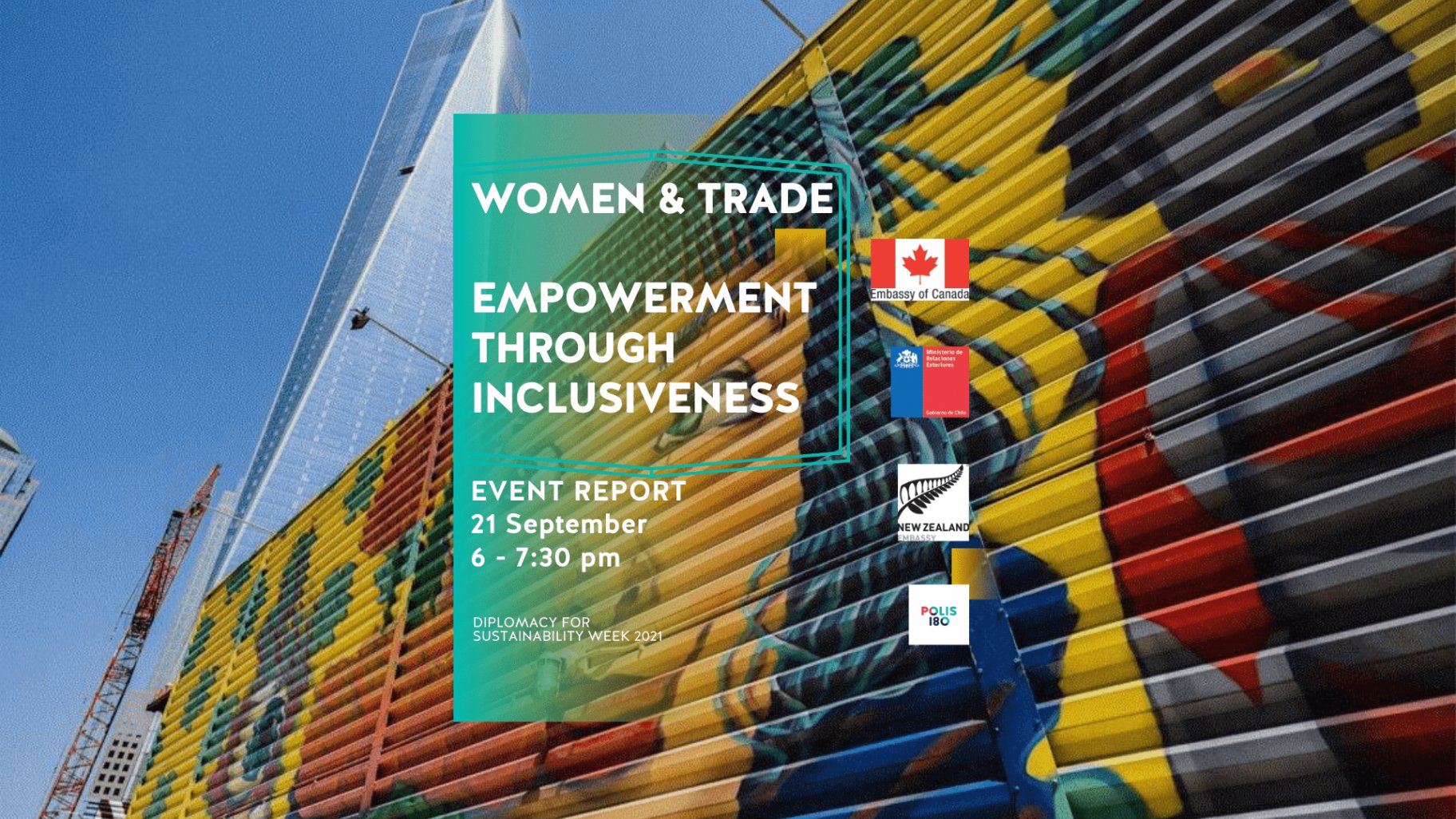Event report
Women & Trade – Empowerment Through Inclusiveness
A cooperation with the Embassies of Canada, Chile and New Zealand
September 21, 6.00 – 7.30 pm

How can the inclusion of women in international trade contribute to gender equality? And what kind of mechanisms are needed to promote women’s participation in trade processes? We discussed these and other questions during our event “Women & Trade – Empowerment Through Inclusiveness”, which took place digitally on 21 September 2021 as a cooperation between Polis180’s Gender and International Politics programme and the Embassies of Canada, Chile and New Zealand in Berlin. The discussion was part of the European Sustainable Development Week (ESDW) 2021. The ESDW is a chance to highlight the activities implemented throughout Europe to achieve the 2030 Global Agenda and the 17 Sustainable Development Goals.
The aim of this event was to highlight the work being done to achieve SDG 5 Gender Equality through effort in international trade policy. Putting women and girls at the centre of economies will fundamentally drive better and more sustainable development outcomes for all. The cooperation was inspired by Canada, Chile and New Zealand’s international efforts regarding the issue. They are the founding members of the Inclusive Trade Action Group (ITAG) and launched the Global Trade and Gender Arrangement (GTAGA) in 2020.
Through our discussion we wanted to highlight the necessity of promoting women’s participation, gender equality and empowerment in and through trade. We deepened our understanding of this issue by highlighting intersectional economic perspectives on women in trade, specifically including voices from Indigenous communities. The three international panelists invited by the embassies represent different levels, in which inclusive trade policy is shaped and implemented.
Ali Hamilton is New Zealand’s Deputy Permanent Representative to the World Trade Organization. Prior to her posting in Geneva, Alison was Lead Adviser in the Trade Negotiations Division at the Ministry Foreign Affairs and Trade (MFAT) and negotiated agreements such as TPP and CPTPP. In the one-on-one discussion with her, we gained insight into the political reasoning that was foundational to the launch of the GTAGA.
Trade, according to Ali, has the potential to both improve the lives of women as well as increase competitiveness of states, which is especially relevant during the recovery from the economic shocks caused by the COVID-19 pandemic. Countries that are not investing into gender equality in trade are missing out.
She highlighted the connection between New Zealand’s core values and the country’s trade driven economy. The trade arrangement, as well as all international trade agreements that New Zealand is party to, has high standards for labour rights and environmental protection. GTAGA aims to add a gender dimension, to ensure that trade becomes a field in which women’s economic empowerment and gender equality are actively fostered. It is vital that the protection of gender equality is solidified within trade agreements, so that there is no possibility for the high standards to be dropped when trying to attract business.
The second panelist was Fernanda Vicente, the Executive President and Co-Founder of Mujeres del Pacífico, a B Corp that drives women entrepreneurs in Latin America. She teaches courses on innovation at several top universities in Chile and has founded numerous NGOs and businesses.
In our discussion, she highlighted the role of trade in enabling sustainable and inclusive development. Women are entrepreneurs, workers, consumers and suppliers, making them a significant community of impact. But the barriers for women’s entry to trade are still high. Cultural norms dictate a certain behaviour that can limit women in their business engagement and makes them more vulnerable, therefore inviting more risk-averse behaviour. A great opportunity, so Fernanda, is in the digital sphere. It offers a marketplace for women with low barriers and high potential that increases their opportunities and networks. It is a space that does not need to be started from scratch, but rather gives women room to creatively adapt it to their needs. Such flexibility is vital for women in trade.
The final panelist was Dawn Madahbee Leach. She is the Chair of the National Indigenous Economic Development Board in Canada. She is a proud member of the Aundeck Omni Kaning First Nation on Manitoulin Island in Central Canada, where she has served as a member of her community’s council. Dawn was instrumental in the development of the OECD’s first-ever international Indigenous 2020 report on “Linking Indigenous Peoples to Regional Development.”
Throughout her input, Dawn highlighted the necessity to include the perspective of Indigenous Peoples into all trade related policy decisions. Indigenous Peoples in Canada face intersecting layers of discrimination and are traditionally marginalised from decision-making processes. Her work therefore focuses on building networks and providing resources to ensure the meaningful participation of Indigenous Peoples in decision-making. Additionally, she highlighted the necessity to provide resources to Indigenous businesses, especially led by women to support their entrepreneurial efforts through (micro-) loans.
After the three one-on-one discussions, the event was broadened and opened to the audience. We discussed issues such as the threat of exploitation under the name of economic empowerment, as well as necessary measures to have a gender-sensitives recovery from the COVID-19 pandemic.
We ended the evening with a question from the audience, about what would constitute a feminist trade policy. Collectively, the panelists highlighted that a feminist trade policy should:
- be based on comprehensive data to effectively identify and address barriers for women within trade;
- ensure that all opportunities are accessible to everyone in each step of decision-making;
- demystify the process of trade by providing information and access to trade opportunities for all, especially traditionally marginalised groups.
Thank you to everyone for joining us!